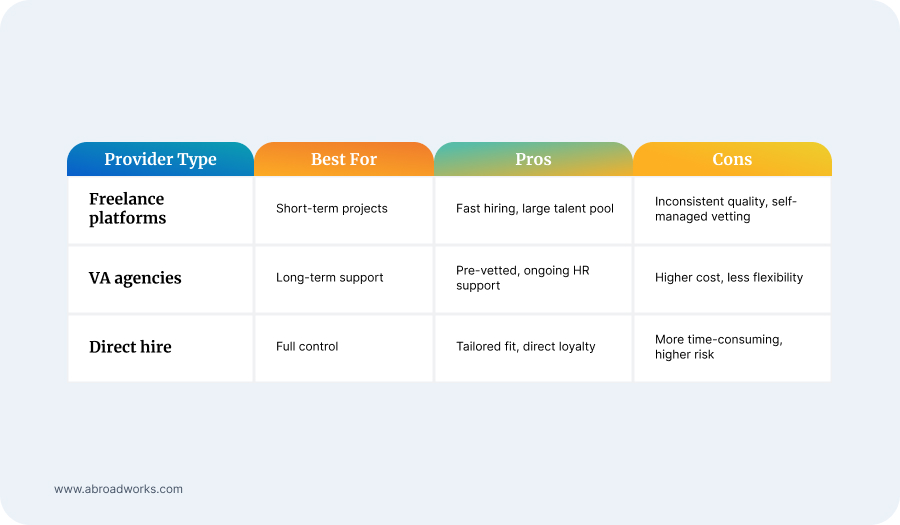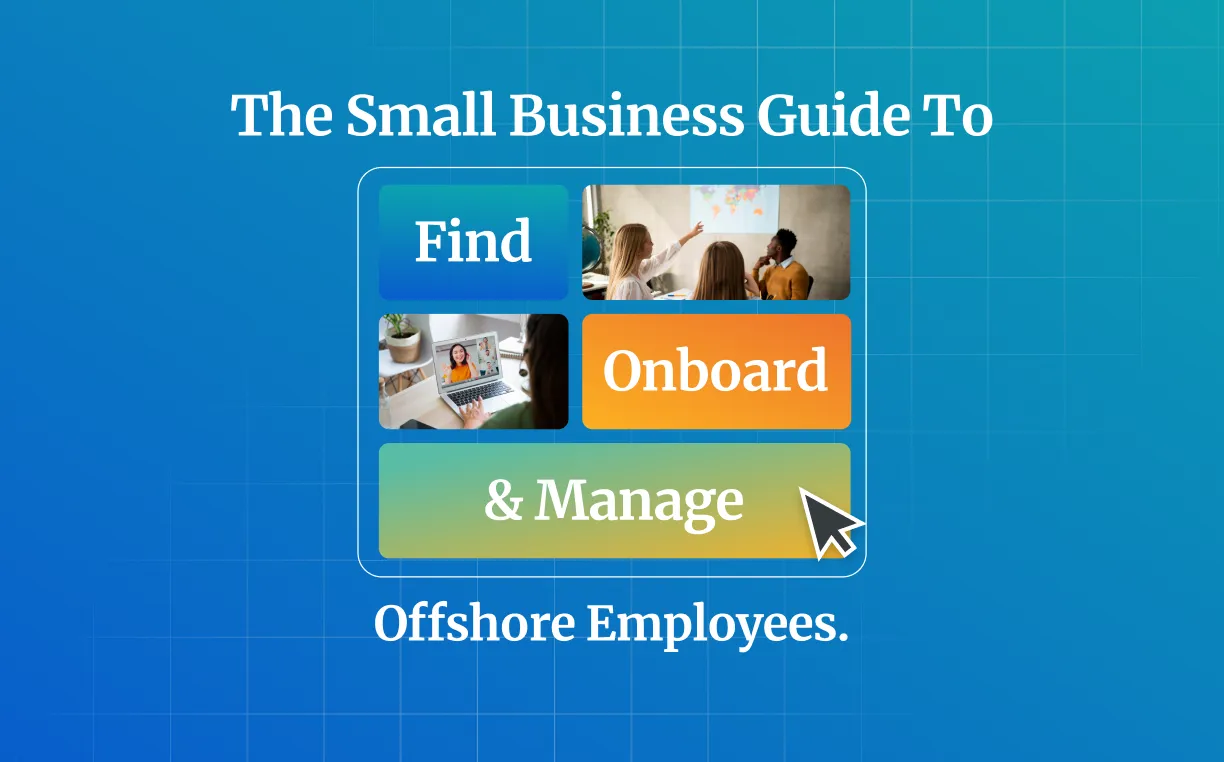How to Choose the Right Offshore Virtual Assistant for Your Small Business
Key Takeaways:
- Define your needs first by identifying tasks that consume your time but don’t require your unique expertise.
- Choose the right hiring model—freelance platforms, VA agencies, or direct hire—based on quality, support, and control.
- Match skills to business requirements to ensure the VA can handle tasks effectively and add real value.
- Consider time zones and availability to maximize productivity and ensure smooth collaboration.
- Test before committing with a small paid project to evaluate work quality, communication, and reliability.
- Plan for long-term growth by integrating VAs into your team and providing opportunities for expanded responsibility.
Operating a small business can feel like a nonstop balancing act, with tasks such as emails, bookkeeping, scheduling, and customer service demanding attention all the time. And when these businesses grow, so too do the demands of all those "do not necessarily need you to do them" tasks.
Enter the offshore virtual assistant (VA). For many growing small businesses, hiring an offshore VA is a way to reclaim time and focus on the core activities that drive revenue and growth. But not all VAs are created equal. To select an appropriate virtual assistant, you need a clear strategy, a good vetting process, and some foresight.
This guide will show you exactly how to choose a VA who meets your business requirements, does not break the bank, and positions you for future success.
1. Understand Your Small Business Needs Before Hiring an Offshore Virtual Assistant
Before you start browsing job sites or writing that job post, grab a coffee and take a minute to think about what's actually bogging you down day-to-day.
Look at your typical week. What tasks keep pulling you away from the work that really matters?
Maybe it's inbox management, social media, or those endless admin tasks that pile up.
Then get real with yourself - which of these things could you actually hand off to someone else? Not everything can (or should) be delegated.
Most importantly, think about what skills would move the needle in your business right now. Do you need someone who's great with customer service? Social media? An organizational guru?
Skip this crucial planning step, and you'll likely end up with a VA who's not the right fit - and that's just a money drain for your business.
Common Offshore VA Tasks for Small Businesses
- Administrative tasks: Email, scheduling, calendar management
- Customer support: Handling inquiries, order tracking
- Bookkeeping: Invoicing, expense tracking, payroll
- Marketing support: Social media posting, SEO, email campaigns
- Research: Market analysis, competitor tracking, lead generation
Pro tip: For a week, jot down every task you tackle. Then, go through and highlight the tasks that are not yours to handle. Voilà, you've just created a job description for your virtual assistant.
2. Key Skills and Experience to Look for in an Offshore Virtual Assistant
Let's face it - not every virtual assistant is cut from the same cloth. While some are good at handling your inbox and calendar, others might be total pros at running your online store or keeping your books in order. When looking for a VA, always focus on three main things:
First up - what tech can they actually use? You'll want someone who knows their way around your essential tools:
- For the money stuff: QuickBooks, Xero, or FreshBooks
- Marketing must-haves: HubSpot, Canva, and Mailchimp
- Project tracking: Asana, Trello, or ClickUp
- Online store basics: Shopify, WooCommerce, or Amazon Seller Central
Then there's industry know-how. Say you're in real estate - wouldn't it be great to find someone who's already familiar with MLS databases and knows what agents need? Or if you're selling products online, a VA who has experience in Shopify orders or Amazon seller support will hit the ground running.
Work samples and references
Before committing, definitely ask to see examples of their work - whether that's a portfolio, client feedback, or a run-down of a complex project they handled. This will give you a clear depiction of their problem solving abilities instead of just looking at technical skills.
Validate with a Trial Project
The best way to really test someone's abilities is through a small paid trial project. Nothing too complex - maybe have them draft a quick email campaign or work through some basic bookkeeping. Just make sure you're clear about what you need and when you need it.
When they deliver the work, pay attention to the details:
- Did they follow your instructions?
- Were they good about communicating?
- Is their work accurate?
Sure, you'll need to invest a bit upfront, but it's way better than discovering issues after you've hired them for a bigger project.
3. How to Evaluate Communication and Cultural Fit for Offshore Assistants
Your virtual assistant does not have to be your friend, but they do need to mesh with how you communicate and embody the values of your business.
What does good communication look like? Here are some green flags to watch for:
- They get back to you when they say they will
- Instead of making assumptions, they'll ask questions to get clarity
- They take initiative and suggest solutions rather than waiting to be told what to do
- They can read the room and match your communication style, whether that's keeping things professional or being more casual
Cultural Fit Matters Too
Being culturally aware is equally important. Offshore virtual assistants may hail from diverse work cultures, so it is essential to communicate your expectations clearly, especially when it comes to feedback, deadlines, and levels of autonomy. For example:
- In some places, challenging authority isn't really done - this might make them hesitant to speak up when they need help
- Different cultures handle feedback differently - some prefer straight talk while others appreciate more of a gentle approach with positives mixed in
Being mindful of these cultural nuances from the start can save you both a lot of headaches.
Consider Time Zones and Availability
Hiring talent from around the world is great for expanding your talent pool. However, time zones can significantly impact how well this arrangement works for your company.
For real time collaboration, it is best to employ someone who is only a few hours behind or ahead of your business time zone. But if you want to maximize the productivity of your offshore team, hire in a time zone opposite to yours so work gets done while you are asleep.
Example: A small business owner in the U.S. can gain a significant advantage by employing talent from the Philippines, which operates 12 to 13 hours ahead of Eastern Standard Time. This means work can be completed during the U.S. nighttime hours and is ready for review when stateside managers begin their workday.
4. Comparing Offshore Virtual Assistant Providers: What to Consider
Hiring a virtual assistant comes down to three main provider routes:
Freelance Marketplaces
You can go through freelance sites like Upwork or Fiverr, which is great if you want to jump right in and find someone quickly. You'll have tons of options from all over the world, and you can hire for exactly what you need, whether that's a few hours or a full-time role.
The catch? You'll need to sort through a lot of applications and do all the vetting yourself. Plus, the really good VAs tend to get snatched up fast.
Hiring Agencies
Another option is working with an agency like AbroadWorks. They do all the heavy lifting - finding and screening candidates, matching you with the right person, and handling all the boring HR stuff. You might feel a bit less in control of the whole process, but it frees up time and effort.
Direct Hire
Or you could hire someone directly, which gives you total control but means you're starting from scratch. You'll build a stronger relationship with your VA this way, but be ready to put in the work - you'll need to handle everything from interviews to training to payroll yourself.
Here’s a quick comparison table:

Don’t Forget Legal and Security Safeguards
- Contracts: Get everything in writing with clear contracts that spell out the important details - what you'll do, how much you'll get paid, when you'll work, and how to handle private information.
- NDAs: Make sure both sides sign NDAs to keep client and company information under wraps. This protects everyone involved and helps build trust.
- Security Tools: Stay safe online by using secure payment systems that guard against fraud. A good password manager like LastPass or 1Password is also worth the investment - it'll keep your accounts locked down tight.
5. Tips for Successfully Onboarding and Managing Your Offshore Virtual Assistant
1. Finding Your Perfect VA: Making it Work from Day One
Getting a great VA is just the beginning - the magic happens when you bring them on board thoughtfully and build a solid working relationship.
2. Getting Started Right
- Put together a clear welcome packet with everything they'll need - logins, tools, and how you like things done. It's like creating a roadmap for success.
- Make them feel like part of the team with a quick intro call or message. A friendly "hey everyone, meet our new VA!" goes a long way.
- Start small - give them a few key tasks to master before piling on more responsibility. This builds confidence on both sides.
3. Keeping Things Running Smooth
- Regular check-ins (weekly or every other week) help you stay on the same page.
- Use tools like Monday to track projects. It's like having a shared to-do list that everyone can see.
- Don't wait to give feedback - catching things early helps build good habits. And remember to celebrate wins! A simple "great job on that report!" can mean the world, no matter where your VA is based.
A Success Story
Here's what happened when one tech startup took the plunge: They hired a VA to handle the daily grind - emails, scheduling, customer service. Within six months, they cut costs by 30% and their in-house team could finally focus on what mattered - building their product. That focus paid off big time with an early launch and fresh funding.
Watch Out For These Pitfalls
- Don't rush into hiring without a test run
- Avoid micromanaging - trust your VA to do their job
- Remember that communication styles vary across cultures
- Don't just go for the cheapest option - skill and fit matter more
Looking to the Future
The best VAs can grow with your business. Ask yourself:
- Could they lead a team of VAs down the road?
- Do they think on their feet and solve problems?
- Are they as invested in your success as you are?
Remember: Companies that treat their VAs as valuable team members, not just hired help, tend to build the strongest, most successful relationships.
Final Thoughts
Hiring an offshore virtual assistant is more than a tactical move to save money, it’s a strategic investment in your business’s future. By defining your needs, choosing the right skills, assessing communication fit, picking the right provider, and managing the relationship with care, you can create a partnership that fuels growth.






